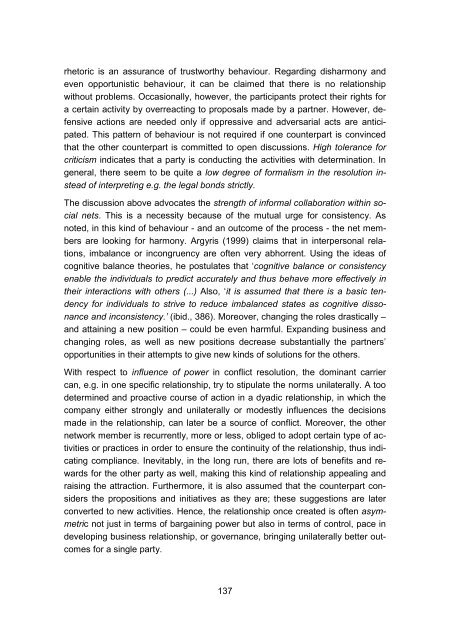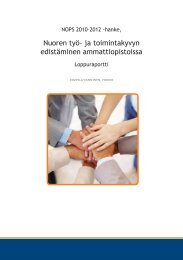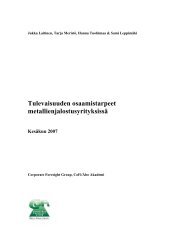849954 sisus
849954 sisus
849954 sisus
Create successful ePaper yourself
Turn your PDF publications into a flip-book with our unique Google optimized e-Paper software.
hetoric is an assurance of trustworthy behaviour. Regarding disharmony and<br />
even opportunistic behaviour, it can be claimed that there is no relationship<br />
without problems. Occasionally, however, the participants protect their rights for<br />
a certain activity by overreacting to proposals made by a partner. However, defensive<br />
actions are needed only if oppressive and adversarial acts are anticipated.<br />
This pattern of behaviour is not required if one counterpart is convinced<br />
that the other counterpart is committed to open discussions. High tolerance for<br />
criticism indicates that a party is conducting the activities with determination. In<br />
general, there seem to be quite a low degree of formalism in the resolution instead<br />
of interpreting e.g. the legal bonds strictly.<br />
The discussion above advocates the strength of informal collaboration within social<br />
nets. This is a necessity because of the mutual urge for consistency. As<br />
noted, in this kind of behaviour - and an outcome of the process - the net members<br />
are looking for harmony. Argyris (1999) claims that in interpersonal relations,<br />
imbalance or incongruency are often very abhorrent. Using the ideas of<br />
cognitive balance theories, he postulates that ‘cognitive balance or consistency<br />
enable the individuals to predict accurately and thus behave more effectively in<br />
their interactions with others (...) Also, ‘it is assumed that there is a basic tendency<br />
for individuals to strive to reduce imbalanced states as cognitive dissonance<br />
and inconsistency.’ (ibid., 386). Moreover, changing the roles drastically –<br />
and attaining a new position – could be even harmful. Expanding business and<br />
changing roles, as well as new positions decrease substantially the partners’<br />
opportunities in their attempts to give new kinds of solutions for the others.<br />
With respect to influence of power in conflict resolution, the dominant carrier<br />
can, e.g. in one specific relationship, try to stipulate the norms unilaterally. A too<br />
determined and proactive course of action in a dyadic relationship, in which the<br />
company either strongly and unilaterally or modestly influences the decisions<br />
made in the relationship, can later be a source of conflict. Moreover, the other<br />
network member is recurrently, more or less, obliged to adopt certain type of activities<br />
or practices in order to ensure the continuity of the relationship, thus indicating<br />
compliance. Inevitably, in the long run, there are lots of benefits and rewards<br />
for the other party as well, making this kind of relationship appealing and<br />
raising the attraction. Furthermore, it is also assumed that the counterpart considers<br />
the propositions and initiatives as they are; these suggestions are later<br />
converted to new activities. Hence, the relationship once created is often asymmetric<br />
not just in terms of bargaining power but also in terms of control, pace in<br />
developing business relationship, or governance, bringing unilaterally better outcomes<br />
for a single party.<br />
137








